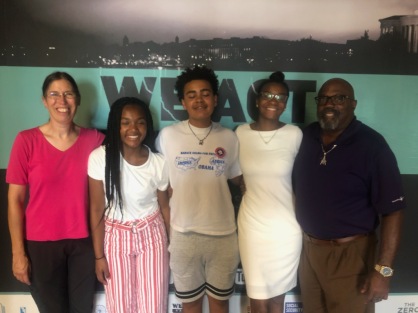District cuts mic on SCTA again in violation of the contract; what Jessie Ryan didn’t want to hear.
Good evening. I’m Nikki Milevsky, the vice-president of the Sacramento City Teachers Association.


Last week, we made a proposal to the District to work around the clock to work on resolving a number of issues that would clear the path toward a more productive relationship with the District.
We want to reiterate our proposal.
In a recent communication from the superintendent, he offered several dates that decision-makers from the District--which we hope includes Superintendent Aguilar and Board President Ryan—are available for negotiations. We would propose meeting on August 22 for the purposes of addressing our most immediate issues:
Finalizing the retroactive payment of the salary schedule arbitration;
Agreeing to an expedited arbitration process to resolve our disagreement regarding the health plan implementation. To date, the District has not agreed to our proposal to have the entire matter heard in a single, expedited arbitration, including the issues raised in the recent complaints issued by PERB.
Filling all the job vacancies in time for the commencement of the school year.
Rescinding the Child Development cuts
Rescinding the cuts to Classified staff
Addressing the more than 30 unfair labor practices that led to the strike on April 11th
And then when those issues have been resolved, the path should be cleared to immediately move into negotiations for a successor contract.
Agreeing to an expedited arbitration process to resolve our disagreement regarding the health plan implementation. To date, the District has not agreed to our proposal to have the entire matter heard in a single, expedited arbitration, including the issues raised in the recent complaints issued by PERB.
Filling all the job vacancies in time for the commencement of the school year.
Rescinding the Child Development cuts
Rescinding the cuts to Classified staff
Addressing the more than 30 unfair labor practices that led to the strike on April 11th
And then when those issues have been resolved, the path should be cleared to immediately move into negotiations for a successor contract.
Our discussion may be a little less contentious considering that the District’s budget now not only includes the 730 students who were lost in the spring, but an additional $6.4 million in Special Education funding.
Additionally, we noted that the budget includes an additional $4.1 million for additional staff based on revised enrollment projections. We can’t emphasize how important it is for the District to use accurate enrollment numbers so that our schools are staffed appropriately. We reiterate our offer to work with the District to make sure that it is staffing based on accurate and up-to-date student enrollment data and like many have been frustrated by the wildly inaccurate projections that have been produced.
In addition, we appreciate the school board voting to support the much-needed School and Community First ballot initiative. I’m sure that you have seen that we in CTA, along with the other major supporters of this historic initiative, have decided to revise the initiative and will be re-circulating petitions to secure its place on the ballot. That is an area that we hope District leaders will work us to accomplish that goal.
Finally, in the aftermath of the ICE raids in Mississippi and the continued increased anti-immigrant sentiment flowing out of Washington, we are pleased to announce that we are working with Luis Cespedes and the Cruz Reynoso Bar Association to develop professional learning modules for SCTA educators in how educators can best provide support services to students and their families in this environment.
In addition, we will be working together with them to develop and facilitate the implementation of a restorative practices culture here in our district, something that we first proposed to the District in 2016. As you know, we jointly developed a restorative practices proposal with the Black Parallel School Board, which begins with implicit bias training, that the District rejected in contract negotiations. Even after the contract settled, we continued to advocate for the implementation of a bottom-up restorative practices’ initiative.
Almost one year ago to the day, SCTA president David Fisher and Carl Pinkston from the Black Parallel school board wrote a joint letter to Superintendent Aguilar requesting the opportunity to meet to discuss moving forward with our proposal beginning with implicit bias training for all staff, consistent with school board policy. For reasons unclear, the District never responded. We hope that times have changed.
As part of our new initiative we hope that our joint work with Bar Association will extend to constructive work with the District, beginning with implicit bias training with for all certificated teachers and other staff.
Sacramento City Teachers Association


























